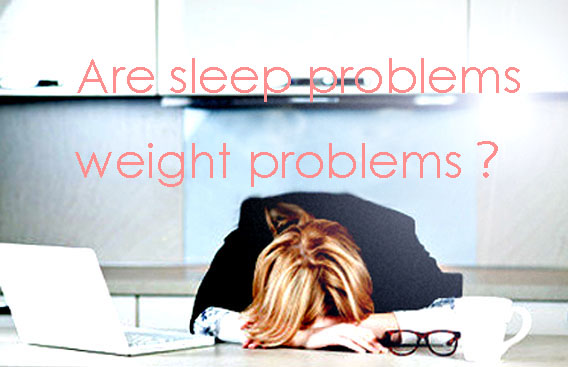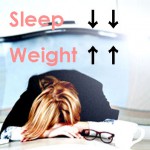
"Lack of sleep makes it harder to lose weight" says sleep study (Insufficient sleep undermines dietary efforts to reduce adiposity). When tired, sleep deprivation effects take over. One accident waiting to happen when you are not catching your Zzz's is not for weight loss, but instead causes accidental weight gain.
What is the connection between sleep and weight loss?
Before, the general consensus on gaining weight because you are not getting enough sleep was that it was because of what you ate into the wee hours of the night.―At least that's the old theory on weight gain due to lack of sleep.
Can't you catch up easily?
Recovering from a sleep deposit is harder than you think. Going on a sleeping binge is not going to help you recover from sleep debt. Neither is trying to lose 10 pounds in a week going to get back to your ideal weight.―Sleeping problems are just like weight problems; it all comes back.
How real are the effects of sleep deprivation in weight control?
How your body manages its hormones takes a heavy hit when you are deprived of sleep. If you ask me, it is as real as menopause weight gain.
Ask someone who knows and you will hear the same thing. Before you wanted to know how to lose weight while pregnant. Now that you aren't getting your daily doses of estrogen, all you want to know about is menopause and weight gain.―Sleep and weight gain are in the hormones.
The Truth About Sleep And Weight Loss! - You Lose Weight Easier When You Are Not Tired
Recent sleep studies have made if clear as day that sleep problems are weight gain problems. Here are some thing to sleep on that may make it easier to maintain your weight, even if it's just a little.
Getting more sleep at night helps you keep your weight down
Getting more sleep helps you eat responsibly, which is everything when you are trying to keep your weight down.
Sleeping more keeps you safe from junk food
The new theory on sleep and maintaining your weight is that not sleeping enough at night makes you less able to resist junk food, having little to do with the calories that you burn staying up late.
Why junk food is so dangerous in a sleep deprived state
A recent sleep study suggests that sleep affects how the part of the brain in charge of emotions deals with cravings for calorie-rich fatty foods. Combined with a less active frontal cortex, you are less likely to make rational decisions about your diet. The findings have been called a "double hit in brain activity" and in being able to eat responsibly. I however call it-sleep debt paid with interest.
"A sleepy brain appears to not only respond more strongly to junk food, but also has less ability to rein that impulse in." says Mathew P. Walker, professor of psychology and neuroscience at the University of California, Berkeley. That is you will not only be more tempted to eat-eat junk food but will also not have what it takes to call them what they are-the munchies.
Old theory on sleep and weight loss
In the past, the theory about why lack of sleep tramples on success in weight loss was that people eat more food simply to make up for all the calories they expend as they burn the midnight oil. However, new studies beg to differ.
Lack of sleep and your weight, the new theory
Sleep studies concluded that the reason why you are eating more may not be to make up for the fact you were pulling an all-nighter, trying to get your paper done in time.
“Their hunger was no different when they were sleep deprived and when they had a normal night of sleep,” Dr. Walker said as he suggests that that main cause behind lack of sleep and weight gain is not being sleep derived itself, but the product of what happens to your metabolism when you are not getting enough sleep.
Samantha Armytage Weight Loss: Lose Weight While You Sleep
Who is Samantha Armytage? You know she's that popular Australian news presenter and Journalist. Don't feel bad if you don't know who I am talking about. However, just so you know―she lost weight sleeping.
Best advice to lose weight ever!!
When you are struggling to stay on top of your diet, Samantha Armytage says to stay in bed.
"I'd lose more weight sleeping than working out ... sleep is number one for me and then exercise."
If you are a just a little bit more curvy and lack sleep, sleeping more may be just what the doctor ordered; despite how losing weight while you sleep sounds.
She has also given up alcohol on weeknights and cut coffee from her diet.
Slowing down on alcohol between Monday and Friday and cutting back on coffee is off to a good start.
"There's no miracle cure, but if I eat well and do a bit of exercise and get decent sleep and have some fun, I can drop a couple of kilos in a week,"
If only it were that easy... Either way you are going to want to be catching those Zzzs ladies.
How much weight did she end up losing?
Through diet and exercise with the following her doctor's orders, Armytage lost 12 kg (26 pounds).
Don't forget to cut back on the carbs
It turns out that there is more to Sam Armytage weight loss that sleeping.
'I lost five kilos and a boyfriend' says TV host Samantha Armytage
She reportedly lost 5 kg (11 lbs) after quitting sugar and white bread.
"You have to be disciplined. I go up and down but I tried to stick to it and it worked, but then I sort of fall off the wagon,"
The most important thing to remember when trying to lose weight is that you got to stick to it. That is if you fall off the wagon, you got to get back on the horse and ride.
Hormones For Sleep And Weight Loss
In a previous Slism, we talked about hormones that helps you lose weight while you sleep.
There are 4 that you need to know before trying to lose weight sleeping.
- Cortisol
This hormone helps you burn off more calories while you sleep. Note that eating 2-3 hours before going to bed slows down the release of cortisol. That's why you should never-ever eat before you sleep.
- Somatotropin
This is one of your growth hormones. As you know growth hormones play an important role in helping you lose weight while you sleep. Lack of sleep limits the somatotropin levels in your blood while sleeping. To alleviate low somatotropin levels, the best thing you can to is get more sleep.
- Leptin
This hormone plays a role in your appetite. High leptin levels helps you get full eating less. To keep up normal leptin levels in your blood, it is advised that you get at least 6 hours of sleep a night.
- Ghrelin
Ghrelin affects how hungry you feel. As you start into sleep debt, the level of ghrelin in your body shoots up. This in turn, makes it harder to control you appetite, not something you want to deal with while on a diet.
Menopause Weight Gain May Be Caused By Lack Of Sleep!?
Going back to the topic of discussion, are sleep problems weight gain problems? If you are going through menopause you have may sleep problems, but does that mean you have weight gain problems?―if you are not sleeping, the answer is most certainly yes.
Preventing menopause weight gain starts with learning how to control your hot flashes
When your body stops producing the same amount of estrogen and progesterone as it used to before menopause, things start to heat up. Warmth spreads over your entire body. You sweat.
In the heat of hot flashes, your dwindling hours of sleep turn into a no issue. However, because sleep problems are weight gain problems; menopause weight gain is not something you can just bury under your arm pits.
So, ask your doctor what it is you can do to alleviate the effects of menopause on your sleep cycle to dodge menopause weight gain.





